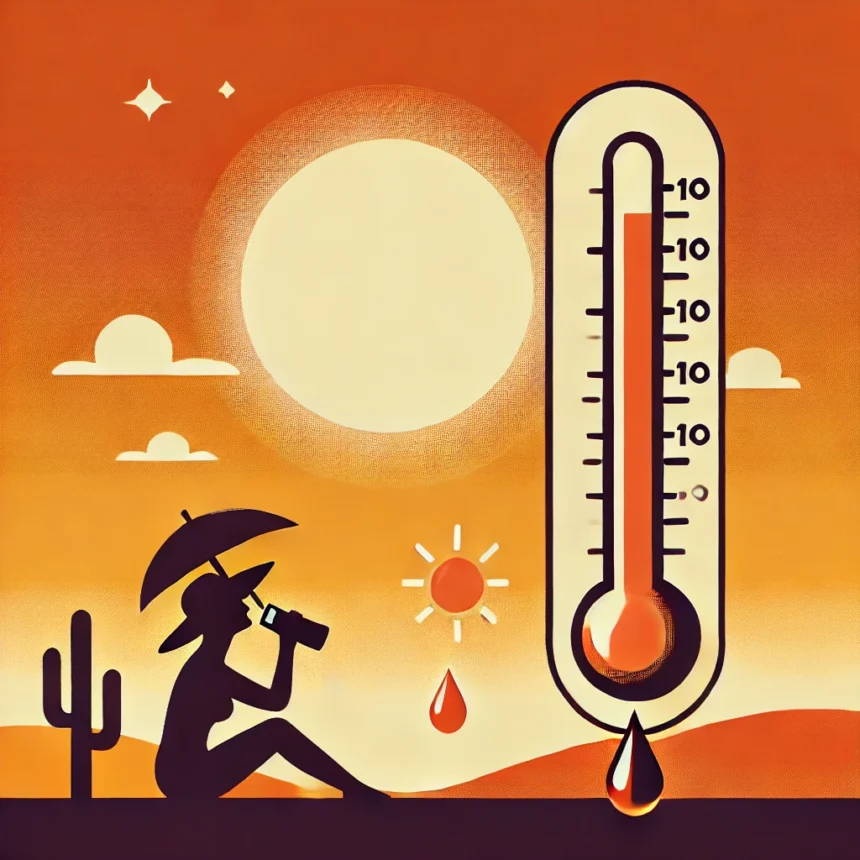Nigeria is currently experiencing an intense heatwave, with temperatures reaching 42°C (108°F) in some parts. The Nigerian Meteorological Agency (NiMet) has issued warnings about rising heat stress, which is a major health danger. Understanding the causes, effects, and protection actions against heatwaves is critical to remaining safe.
What is Causing the Heat Wave in Nigeria?
A heatwave is a lengthy period of abnormally high temperatures, which are often exacerbated by high humidity and a lack of rainfall. The present heatwave in Nigeria is caused by a number of reasons. Climate change is a significant contributor. Rising global temperatures cause more frequent and intense heatwaves. Furthermore, dry season patterns have exacerbated, with Nigeria’s harmattan experiencing high temperatures due to a lack of cooling winds. The urban heat island effect has a particularly strong impact on metropolitan areas. Cities with dense buildings, asphalt roads, and little greenery trap heat, leaving them substantially warmer than rural places. High humidity levels also contribute, as moisture in the air inhibits sweat from draining properly, making it feel even hotter.
How the Heatwave is Affecting Nigerians
The continuous heatwave has a negative impact on daily living, including health, infrastructure, and agriculture. Many Nigerians are feeling dehydration, dizziness, exhaustion, and headaches, raising serious concerns about their health. Cases of heat exhaustion and heatstroke are increasing. The high temperatures are also putting a strain on Nigeria’s electricity supply, with increasing use of fans and air conditioners resulting in power disruptions. Water scarcity is another issue, as high evaporation rates reduce water supply in many places. This impacts both household water supplies and agriculture. Farmers are battling with dry soil and low crop yields, which may result in higher food costs in the coming months. Furthermore, high heat impairs sleep and productivity. Many people struggle to sleep at night due to the high temperatures, resulting in weariness and poor work performance throughout the day.
MUST READ ;The Science of Circadian Rhythms and Their Effect on Health
How to Protect Yourself from the Heat Wave
- Stay hydrated; Drinking plenty of water throughout the day is vital for replenishing lost fluids. Dehydration can lead to dizziness, disorientation, and weariness. Caffeinated, alcoholic, and sugary beverages should be avoided as they might cause dehydration.
- Limit outdoor activities; Try to stay indoors between 10 a.m. and 4 p.m., when the sun is at its peak. If you have to go outside, wear a wide-brimmed hat, sunglasses, and sunscreen to protect yourself from the heat.
- Wear light, loose clothing; Choose light-coloured, loose-fitting cotton clothing that allows air to circulate and helps you stay cool. Dark or tight clothing can trap heat, making you feel warmer.
- Use cooling methods; Taking a chilly shower is one of the most effective strategies to reduce body temperature. To cool down rapidly, apply a cold, moist cloth to your forehead, wrists, and neck. If you don’t have air conditioning, stay in a shaded or well-ventilated place and use a hand fan as needed.
- Adjust your diet; What you consume can also help keep you cool. Fruits high in water content, such as watermelon, cucumber, and oranges, aid to keep the body hydrated. Avoid hot and oily foods, as they raise body temperature and create discomfort.
- Improve airflow at home; Keeping your home cool is crucial. To let in fresh air, open windows early in the morning and evening when temperatures are lower. Close drapes or blinds during the warmest hours of the day to keep direct sunlight out. A dish of ice water in front of a fan will provide a cooling effect.
In conclusion, the present heatwave in Nigeria poses a severe health risk, but taking precautions can help mitigate its effects. Staying hydrated, wearing light clothing, reducing outdoor exposure, and staying cool indoors are all important measures towards being safe. As climate trends evolve, intense heat episodes like these could become more common. Raising knowledge and implementing heatwave survival tactics can help individuals and communities manage more effectively with severe temperatures. Stay safe, cool, and take care of yourself during this heat wave!


